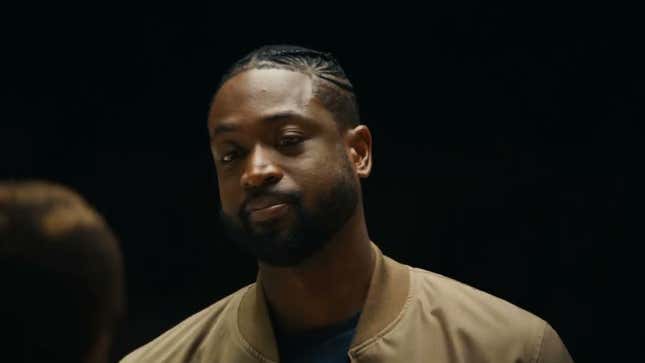
Ahead of what could be Dwyane Wade’s final NBA home game tonight, a beer company released an advertisement highlighting the Miami Heat player and his generosity. Wade and his wife Gabrielle Union are well-known for their charitable work and activism: The basketball player has established a college scholarship, visited students in Parkland after the Marjory Stoneman Douglas school shooting, and supported community-based organizations through his foundation. This work is newsworthy and admirable, and, in the ad put out today, is being used to sell beer.
In the commercial, five people whose lives Wade changed for the better—Wade’s mother JoLinda; the sister of a Parkland shooting victim; a woman who went to college on Wade’s scholarship fund; a man whose life trajectory was inspired by Wade; and a woman who Wade took on a shopping spree after her house burned down—show up to surprise him on a carefully lit basketball court.
“I have no idea who’s coming,” Wade says. “Like, literally, no idea.” The guests tell Wade how he helped them and what it meant to them. They give him mementos that recall the ways he changed their lives. Piano music tinkles softly in the background. Wade smiles. At one point he appears to rub tears from his eyes.
The beer commercial is clearly meant to be a tear-jerker, and it seems to have had the desired effect, with tears being jerked all over. That’s to be expected: Everyone has a job to do, and just as Dwyane Wade did his by being one of the best NBA players of all time, the beer company’s marketing team did theirs by using the suffering and resilience of real human beings to manipulate viewers’ emotions (in the service of selling beer). Well-paid professionals doing their work: That’s the story of the American economy.
The well-paid professionals who did their job here made an ad that succeeded in what I assume were its intentions: It made people pay attention to it, had it stick with them, and got attention for the product they’re marketing. Whether Wade is a genuinely charitable person who genuinely helps people (he is and does, by all accounts) isn’t the point: The point is pushing suds, and doing so in a way that will make people feel good about (in ascending order) a famous person, themselves, and (by the transitive property) the company that pays the famous person and so makes it possible for people to feel good about themselves.
If you, as a well-paid professional here, were clever, you could get people feeling things over your beer ad; if you were a little more clever than that, you could get them to shill your beer for you because you made them feel the right way; if you were really clever, you could maybe make an ad that would sucker reporters and media organizations, whose entire reason for existing is to discern between carefully presented narratives and the truth, into eagerly sharing your ad as if it were news, spreading it through respectable channels and so putting the idea that the beer company should be associated with real human emotions on par with anything else that might come from trusted, authoritative sources:
If you were really, really clever, you could maybe make an ad that would not only get obliging reporters and media organizations sharing your ad, but spark debate among reasonable people over whether this beer commercial is harmless or an obviously cynical attempt to capitalize on tragedy for corporate gain, so that anyone scoffing at your tactics might be read as a cynic who doesn’t like good things or authentic feelings, thereby aligning your beer with things that are good and authentic.
Reporters like ESPN’s Dan Le Batard, who wrote this worthwhile tribute to Wade, should by all means feel free to look back and take stock of Wade’s charity and generosity throughout his career; there are a lot of examples to choose from, and plenty of angles to take. None of them have to involve doing the work a beer company pays its marketing team to do.
Even if a beer commercial makes a reporter feel real feelings (again, kudos to the company’s marketing team), there’s no reason to publicly say so to an audience that presumably—hopefully?—takes them seriously because they have credibility. In the most generous reading of things, doing so just allows marketers to leverage that credibility for free. In a less generous and more depressing reading, you have some of America’s best-known basketball reporters lazily resorting to explaining their subjects through terms set by a bad commercial for worse beer, something that involves showing enough ass that you’d hope people would want to cover it. In any case, Dwyane Wade seems like a good dude, but don’t put too much stock in any reporter who says they teared up over a commercial that weaponizes real charity against criticism of a maudlin ad, and don’t drink bad beer.